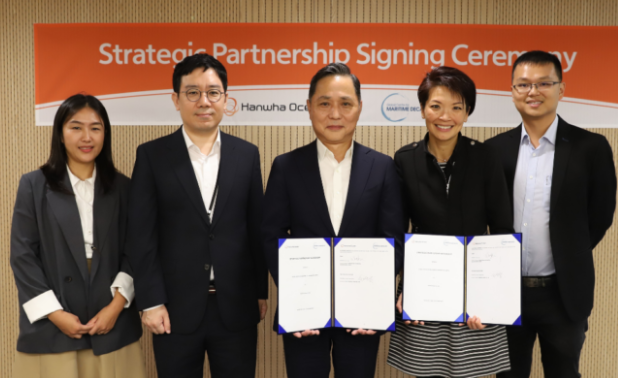
| Subject | Hanwha Ocean partners with GCMD to advance maritime decarbonization | ||
|---|---|---|---|
| Reg. date | 2024-10-22 | Views | 1405 |

[Offshore Energy/ October 21, 2024] The Global Centre for Maritime Decarbonization (GCMD) and Hanwha Ocean have signed a five-year strategic partnership to advance maritime decarbonization in the areas of alternative low-/zero carbon fuels, energy efficiency technologies, and onboard carbon capture.
Hanwha Ocean, an affiliate of Hanwha Group, is dedicated to creating a green energy value chain. By leveraging the group’s established expertise in hydrogen, wind power, liquefied natural gas (LNG), and ammonia, along with its knowledge in energy production and transportation, Hanwha Ocean aims to develop advanced technologies for effective decarbonization solutions.
The partners support the ammonia value chain for the maritime sector. Hanwha Ocean is committed to developing ammonia-powered vessels, having recently partnered with sibling companies, Hanwha Aerospace and Hanwha Power Systems.
Meanwhile, GCMD has recently completed a pair of ammonia transfers to showcase breakbulk and mimic bunkering operations between vessels at anchorage in the Pilbara region. This accomplishment paves the way for assessing the feasibility of ammonia bunkering in multiple ports when ammonia-fuelled vessels become available, according to GCMD. Hanwha Ocean will be among the ecosystem of partners in GCMD’s initiative to enable key ports for this purpose.
Hanwha Ocean and GCMD are actively advancing onboard carbon capture and storage technologies. Last year, the Korean Register and the Marshall Islands Registry granted Hanwha Ocean an Approval in Principle (AiP) for its carbon capture and storage technology, which is set to be implemented on future LNG carriers.
On the other hand, GCMD, in collaboration with a consortium of maritime players, has recently released a report to assess the technical, operational and economic feasibility of installing a OCCS retrofit onboard an MR tanker to reducing emissions.
The study finds that OCCS technology can reduce CO2 emissions by as much as 20% at a fuel penalty of 10%. In the interim, port readiness and infrastructure availability, as well well-defined regulations around offloading need to be addressed before OCCS can see wide adoption across the maritime industry.
“With Hanwha Ocean joining us as a Strategic Partner, I am excited about our combined efforts to advance decarbonisation. Hanwha Ocean and GCMD are addressing different parts of the value chain, whether in enabling ammonia as a marine fuel or further closing gaps in the onboard carbon capture value chain,” Professor Lynn Loo, CEO of GCMD, said.
“Hanwha is actively participating in every wave of green innovation, developing advanced technologies to provide carbon-neutral maritime solutions. The time for action is now, and we are fully committed to driving meaningful change. Embarking on this journey with GCMD excites us as we work together to realize a carbon-free future for shipping,” Young Chang (James) Shon, CTO of Hanwha Ocean, stated.
“Through this collaboration, not only will we contribute to environmental sustainability, but we will also create economic value for the maritime industry by paving the way for future-proof solutions.”
GCMD and Hanwha Ocean are united in their commitment to help the shipping industry meet the IMO’s GHG emissions reduction targets. This partnership will integrate GCMD’s initiatives to lower adoption barriers for decarbonization solutions through pilots and trials with Hanwha Ocean’s advancements in green shipping technologies, the partners concluded.
 HOME
HOME








